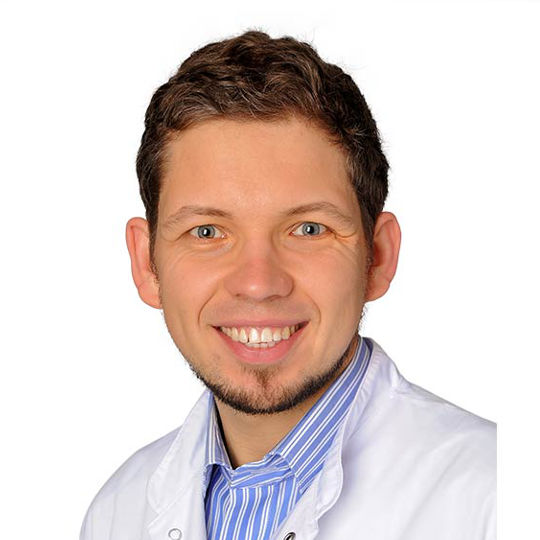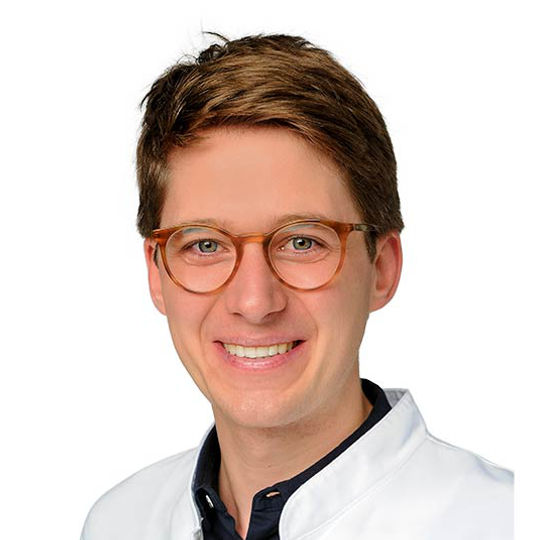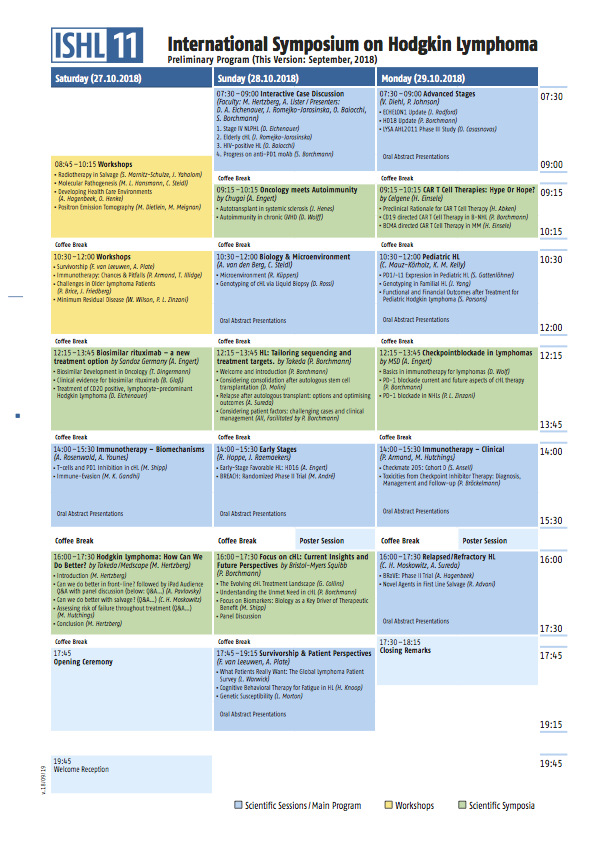First-hand Impressions
The 11ᵗʰ International Symposium on Hodgkin Lymphoma (ISHL11) is only four months away and this newsletter should give you an update on the current content. In addition, the Congress Chairman and our Scientific Secretaries share their personal views and expectations.

Personal view, Andreas Engert
Dear colleagues and friends,
The International Symposium on Hodgkin Lymphoma has become the conference to go to if you want to learn more on the most recent events in this malignancy.
We had more than 1200 attendees at our 10th Anniversary Symposium held in Cologne in 2016. Since then many new studies have been reported. Examples are the AHL 2011 randomized phase III trial performed by the LYSA study group for patients in advanced stage Hodgkin Lymphoma. In this trial, patients who were PET-negative after two cycles of BEACOPP escalated received four additional cycles of ABVD in the experimental arm. There was no difference between the previous LYSA standard of six cycles of BEACOPP escalated as compared to the two cycles of BEACOPP escalated plus four cycles of ABVD treatment. Importantly, there was no additional radiotherapy in this trial. More recently, the GHSG HD18 trial in advanced stage Hodgkin Lymphoma patients demonstrated that those who were PET-negative after two cycles of BEACOPP escalated just needed two more cycles. Both trials showed that early PET is a strong predictor of response in advanced stage Hodgkin Lymphoma allowing substantial dose reduction and the omission of radiotherapy in the majority of patients.
At the forthcoming ISHL11, we will celebrate the 40th birthday of the GHSG and will see more very interesting new approaches and scientific highlights. On behalf of the German Hodgkin Study Group, I cordially invite you to this international symposium!

Personal view, Sven Borchmann
I very much look forward to this October’s ISHL11 in Cologne. I attended my first ISHL while still working on my doctoral thesis some years ago. From my first time attending, I was amazed to see this large group of dedicated physicians and researchers come together to share their intense interest in Hodgkin Lymphoma. Now, some years later, it is a great honour to contribute to getting ISHL11 off the ground as scientific congress secretary.
Due to my personal interest in translational research, I am very much looking forward to this year’s conference as the premier event to bring researchers working on lymphoma biology and clinicians together. This year, we will host a workshop on minimal residual disease in Hodgkin Lymphoma. Here, novel and exciting new approaches that could help to improve treatment individualisation will be discussed. Apart from hearing about new data, I also hope that this workshop will help to ignite new collaborations.
Moreover, so many questions on the way forward to novel immunotherapeutic combinations are still unanswered in Hodgkin Lymphoma and I hope that many of the abstracts submitted will help guiding the way forward. Be it novel combinations in early clinical trials or exciting research from the labs that will help us to understand how currently successful treatments work and how they can be improved.
Finally, we have changed some things to increase the visibility of each abstract submitted this year. We introduced poster pitches in the main sessions, split the poster session into two sessions and have increased the number of oral abstract presentations. With all these changes, I hope that every participant will make the most out of ISHL11 and get the chance to present to and discuss their work with the Hodgkin Lymphoma community.
See you in Cologne!

Personal view, Paul Bröckelmann
I am already very excited about ISHL11, which will be my third ISHL overall and the first one as congress secretary in an organizing role. Over the past years we have witnessed substantial development in therapeutic approaches for both, treatment naïve and relapsed Hodgkin Lymphoma. This is largely due to results of large randomized phase III trials as well as the increasing implementation of modern drugs.
Recently, several preclinical studies were able to shed more light on the mechanism of anti-PD1 inhibition in Hodgkin Lymphoma. At ISHL11, we will discuss latest data on combinations of anti-PD1 antibodies with conventional chemotherapy in first-line treatment. Carefully interpreting these results and further refining combination approaches to optimally exploit synergies is one of our major goals. In addition, numerous trials investigate innovative combinations of targeted drugs in the relapsed and refractory setting with a focus on effective and tolerable salvage regimens. While many of these regimens are highly effective, their role in routine clinical care needs to be determined since data from randomized comparisons to conventional salvage is missing. Whether these strategies might ultimately allow an omission of high-dose chemotherapy remains a highly interesting question to be discussed at ISHL11.
Another personal highlight for me will be the workshop on Developing Health Care Environments which aims at developing strategies on how capacity building in these countries may be improved and supported by the ISHL community. I am excited to hear speakers from Tanzania and Venezuela who will shed light on the clinicians’ point of view and discuss next steps in supporting their efforts.

Personal view, Dennis Eichenauer
I am looking forward to ISHL11 which will be my 5th symposium on Hodgkin Lymphoma in Cologne overall and the 1st as part of the organizing committee. Since my first ISHL in 2007, many efforts to improve the treatment of Hodgkin Lymphoma have been made and the prognosis of affected patients has been further improved by the introduction of the antibody-drug conjugate brentuximab vedotin and the anti-PD-1 antibodies nivolumab and pembrolizumab. This is especially true for patients failing high-dose chemotherapy and autologous stem cell transplantation who generally have a dismal prognosis. However, it was also recognized that the high cure rates achieved by multi-agent chemotherapy and radiotherapy come at the cost of relevant acute and – more importantly – long-term toxicity. Therefore, survivorship aspects have become increasingly important.
At this year´s ISHL, we will possibly see further improvement in the outcome of Hodgkin Lymphoma patients and ways to reduce therapy-related toxicities. The lingering debate whether ABVD or BEACOPP-based treatment should be given will be continued in the session on advanced Hodgkin Lymphoma. Here, ECHELON-1 comparing ABVD and a brentuximab vedotin-AVD variant will be discussed in depths. In addition, the GHSG HD18 trial and the LYSA AHL2011 study investigated PET-guided treatment reduction in patients receiving BEACOPP. Survivorship aspects will be addressed in a workshop, a scientific session and the key-note lecture of the conference. I look forward to hearing how patients at an increased risk to develop late effects can be recognized very early and what potential interventions could be.
These and other interesting topics in Hodgkin Lymphoma research will be addressed at this forthcoming symposium. We look forward to meeting with you at ISHL11!
See you in Cologne!
Might also be interesting
News on the Main Program
The detailed program including speakers is now available. Latest results from clinical trials and novel insights will be presented by world-leading experts in the field.
Follow-Up Care of Hodgkin Lymphoma Survivors is important
Most patients with Hodgkin Lymphoma (HL) achieve long-term remission after adequate first-line treatment. Nonetheless, follow-up care is important for several reasons…
Limited Hotel Capacities
Hotel rooms are allocated on a first-come, first-served basis, so we advise you to reserve early.
You can either book directly with the hotel or take advantage of the booking form you can download on our Website and send to us via info@hodgkinsymposium.org.
Please be aware that hotel capacities are limited due to parallel trade fair in Cologne.
Scientific Program Highlights: Biomarkers
Treatment stratification by PET/CT has improved outcome and reduced treatment toxicity in Hodgkin Lymphoma. Recently, results of the GHSG HD18 trial were presented at EHA 2017. In this study…
Developments in Advanced Stages
Latest Results of Large Scale Randomized Phase Ⅲ Trials in Advanced Stage HL
One central question in Hodgkin Lymphoma is the best treatment for advanced stage patients. Initial data of the company-sponsored international ECHELON-1 trial were expected with substantial interest and will be presented at ASH 2017 in detail…
